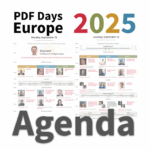Intellectual Property Rights (IPR) Policy
This IPR Policy is part of the PDF Association's Charter. All members agree to abide by its terms as a condition of membership.
This text was adapted from and is fully aligned with the ISO/IEC/ITU Common Patent Policy.
The following is a "code of practice" regarding patents covering, in varying degrees, the subject matters of PDF Association publications (collectively referred to as “Deliverables”).
The rules of the "code of practice" are simple and straightforward. Deliverables are drawn up by technical and not patent experts; thus, they may not necessarily be very familiar with the complex international legal situation of intellectual property rights such as patents, etc.
Deliverables are non-binding; their objective is to ensure compatibility of technologies and systems on a worldwide basis. To meet this objective, which is in the common interests of all those participating, it must be ensured that the Deliverables, their applications, use, etc. are accessible to everybody.
It follows, therefore, that a patent embodied fully or partly in a Deliverable must be accessible to everybody without undue constraints. To meet this requirement in general is the sole objective of the code of practice. The detailed arrangements arising from patents (licensing, royalties, etc.) are left to the parties concerned, as these arrangements might differ from case to case.
This code of practice may be summarized as follows:
- The PDF Association is not in a position to give authoritative or comprehensive information about evidence, validity or scope of patents or similar rights, but it is desirable that the fullest available information should be disclosed. Therefore, any party participating in the work of the PDF Association should, from the outset, draw the attention of Standards Director or the CEO, respectively, to any known patent or to any known pending patent application, either their own or of other organizations, although the PDF Association is unable to verify the validity of any such information.
- If a Deliverable is developed and such information as referred to in paragraph 1 has been disclosed, three different situations may arise:
- The patent holder is willing to negotiate licences free of charge with other parties on a nondiscriminatory basis on reasonable terms and conditions. Such negotiations are left to the parties concerned and are performed outside the PDF Association.
- The patent holder is willing to negotiate licences with other parties on a non-discriminatory basis on reasonable terms and conditions. Such negotiations are left to the parties concerned and are performed outside the PDF Association.
- The patent holder is not willing to comply with the provisions of either paragraph 2.1 or paragraph 2.2; in such case, the Deliverable shall not include provisions depending on the patent.
- Whatever case applies (2.1, 2.2 or 2.3), the patent holder has to provide a written statement to be filed with the PDF Association, using the "Patent Statement and Licensing Declaration" Form. This statement must not include additional provisions, conditions, or any other exclusion clauses in excess of what is provided for each case in the corresponding boxes of the form.
- All drafts submitted for comment shall include on the cover page the following text:
“Recipients of this draft are invited to submit, with their comments, notification of any relevant patent rights of which they are aware and to provide supporting documentation.”
- A published document for which no patent rights are identified during the preparation thereof shall contain the following notice in the Foreword:
“Attention is drawn to the possibility that some of the elements of this document may be the subject of patent rights. The PDF Association shall not be held responsible for identifying any or all such patent rights.”
- A published document for which patent rights have been identified during the preparation thereof shall include the following notice in the introduction:
“The PDF Association draws attention to the fact that it is claimed that compliance with this document may involve the use of a patent concerning (...subject matter…) given in (...subclause…).”
Questions about this policy should be directed to info@pdfa.org.



